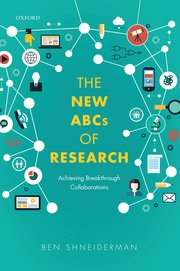 |

|
 |
ISR-affiliated Distinguished University Professor Ben Shneiderman (CS/UMIACS) is the author of a new book published by Oxford University Press, The New ABCs of Research: Achieving Breakthrough Collaborations. The book recognizes the unbounded nature of human creativity, the multiplicative power of teamwork, and the catalytic effects of innovation. Contemporary research teams get a further boost from fresh ways of using the Web, social media, and visual communications tools that amplify collaborations. It reports on the growing number of initiatives to promote more integrated approaches to research so as to promote their expansion. It is meant as a guide to students and a manifesto for policy makers, challenging widely-held beliefs about how applied innovations evolve and how basic breakthroughs are made. The first guiding principle for research is that applied and basic research combined (ABC Principle) produces better research in both. The second guiding principle is that blending the methods of science, engineering and design (SED Principle) will improve research outcomes. Educational experiences that cover the scientific method, engineering prototyping, and design thinking will enable future researchers to choose whether they conduct controlled experiments, do field studies, or brainstorm with diverse stakeholders. Teamwork is a key theme of this book, but there is always room for the lone technology tinkerers or solitary theorists who passionately pursue their dreams, until they are ready to share with others. However, organizational partnerships and collaborative teamwork appear to accelerate innovation and produce more frequent success stories that reshape education, communities, business, and government. The prevalence of new tools and research strategies means that these higher ambitions can be realized. Web-based libraries, open access publishing, social media engagement, visual communication tools, and other new technologies mean that new opportunities are available to researchers. These technologies, coupled with new research strategies such as citizen science, big data analysis, visual analytics, and rigorous cases studies means that the higher ambitions of research teams can be achieved. Bold ideas and valuable innovations ultimately come from a single individual, but individuals are more likely to create them when working within a team, a well-organized network, and a supportive community. Therefore this book covers the strategies for nurturing individuals, managing teams, weaving networks, and cultivating communities. | Read a review of the book by Rick Rylance in Nature |
Related Articles:
Professor Emeritus Dana Nau Publishes New AI Book
New book by Jeffrey Herrmann: Metareasoning for Robots
Five Clark School authors part of new 'Age of Information' book
Ben Shneiderman video talk on human-centered AI now available
Babadi, Chellappa contribute to Springer reference work on computer vision
Shneiderman, Varshney inducted into IEEE Visualization Academy
Shneiderman to speak at Arena Civil Dialogue, Aug. 12
Shneiderman receives honorary doctorate from Swansea University
Statistical Data Fusion: new book by Kedem, De Oliveira, Sverchkov
NAI Fellows' names read into the Congressional Record
March 17, 2016
|

